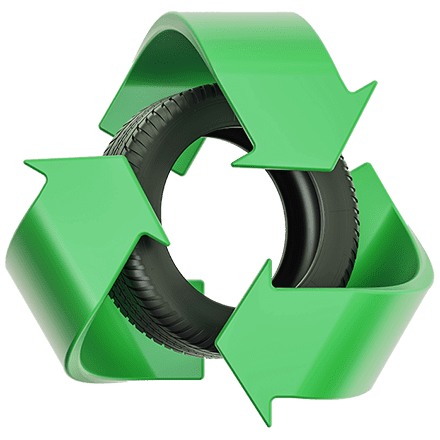
We turn used tires into fully reusable, high-value polymer materials—closing the loop on tire waste.
Ancora™ polymers let manufacturers reuse rubber from end-of-life tires to make new ones—closing the loop in tire production. Our patented process converts 100% of crumb rubber into a functional thermoplastic intermediate, preserving valuable components like carbon black, polymer, and additives and reducing the need for natural rubber, synthetic rubbers, and chemical-based additives.
This is more than recycling—it’s a breakthrough. Prism’s innovative polymers are a first for science and a major step forward for sustainability, delivering improved, high-value materials that reduce the need for virgin rubber and support more responsible tire manufacturing.
Over 1.3 billion tires are discarded globally each year. Many end up in landfills or are incinerated—causing pollution and wasting valuable material. Prism Worldwide offers a practical and scalable solution: converting end-of-life tires (ELTs) into high-performance polymer materials, reducing landfill waste and the need to extract new resources like rubber and oil.
Unlike traditional recyclers that simply blend or rebond used rubber, Prism has reinvented the recycling process at a molecular level. Our patented technology combines gentle chemistry with mechanical energy to transform vulcanized rubber—once considered unrecyclable—into entirely new, reusable polymeric materials.
This scientific breakthrough has enabled Prism to lead the industry in sustainable thermoplastic elastomers (TPEs). We are the first to successfully integrate 50% sustainable TPE into commercial products without compromising performance or cost.
We don’t manufacture finished products—we empower manufacturers with sustainable, high-quality alternatives to traditional materials.
Prism addresses the global tire waste challenge with local, domestically produced sustainable materials, providing reliable, cost-effective, and stable supply chains independent of crude oil markets
With over a billion tires discarded annually, Prism’s technology directly tackles this global waste problem—turning 100% of the rubber into reusable materials and reducing pressure on landfills and incineration.

Producing synthetic rubbers and carbon black generates significant emissions. Prism’s process retains valuable components from tires, enabling up to 86% lower carbon emissions when replacing virgin materials with our sustainable polymers.
Our materials are produced domestically using local resources. They’re cost-effective, stable, and independent of volatile crude oil markets—providing reliable, long-term value.
x
| Cookie | Duration | Description |
|---|---|---|
| cookielawinfo-checkbox-analytics | 11 months | This cookie is set by GDPR Cookie Consent plugin. The cookie is used to store the user consent for the cookies in the category "Analytics". |
| cookielawinfo-checkbox-functional | 11 months | The cookie is set by GDPR cookie consent to record the user consent for the cookies in the category "Functional". |
| cookielawinfo-checkbox-necessary | 11 months | This cookie is set by GDPR Cookie Consent plugin. The cookies is used to store the user consent for the cookies in the category "Necessary". |
| cookielawinfo-checkbox-others | 11 months | This cookie is set by GDPR Cookie Consent plugin. The cookie is used to store the user consent for the cookies in the category "Other. |
| cookielawinfo-checkbox-performance | 11 months | This cookie is set by GDPR Cookie Consent plugin. The cookie is used to store the user consent for the cookies in the category "Performance". |
| viewed_cookie_policy | 11 months | The cookie is set by the GDPR Cookie Consent plugin and is used to store whether or not user has consented to the use of cookies. It does not store any personal data. |